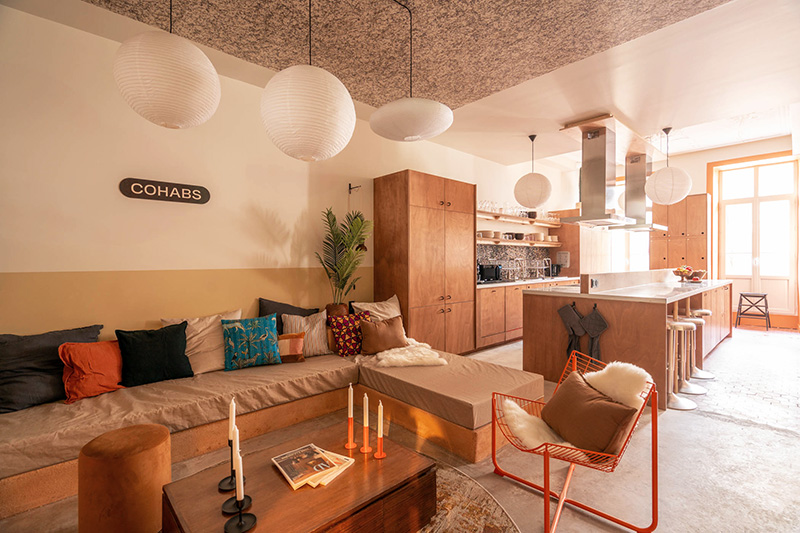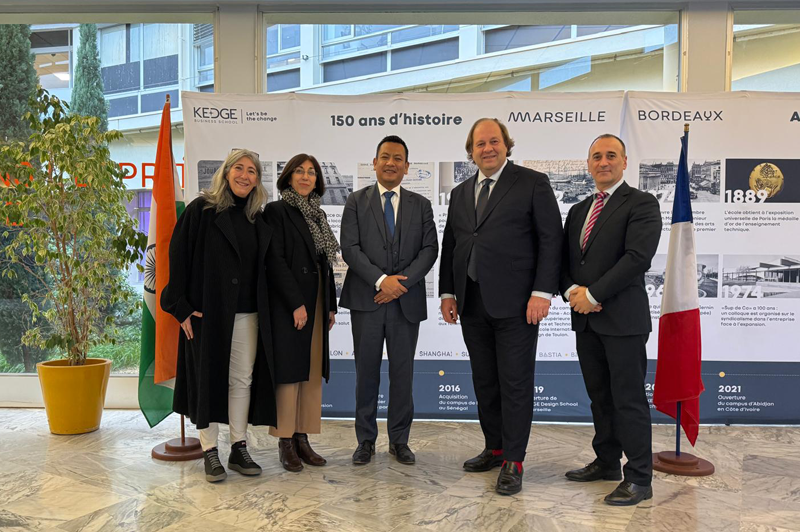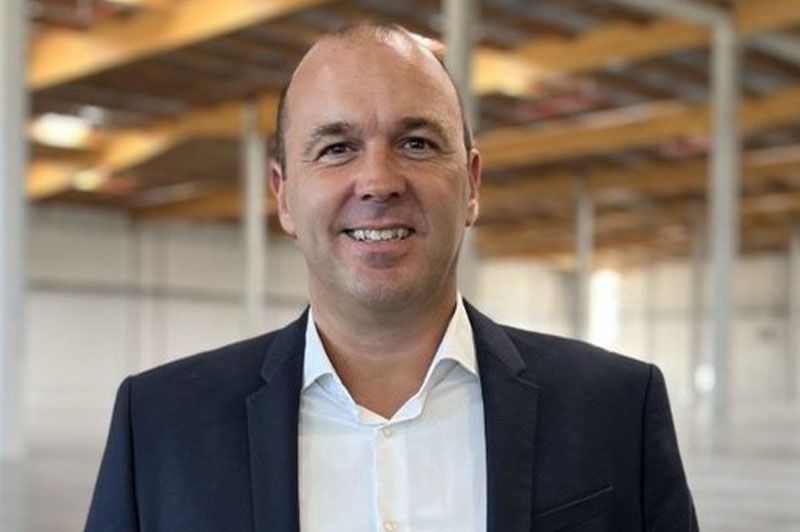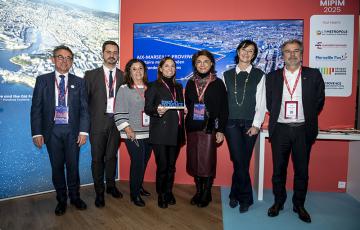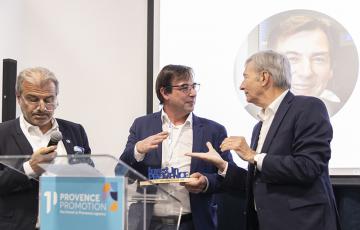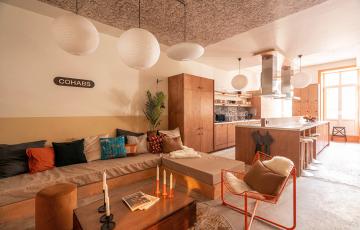Dinner and discussion in Paris to highlight the green successes in Aix-Marseille
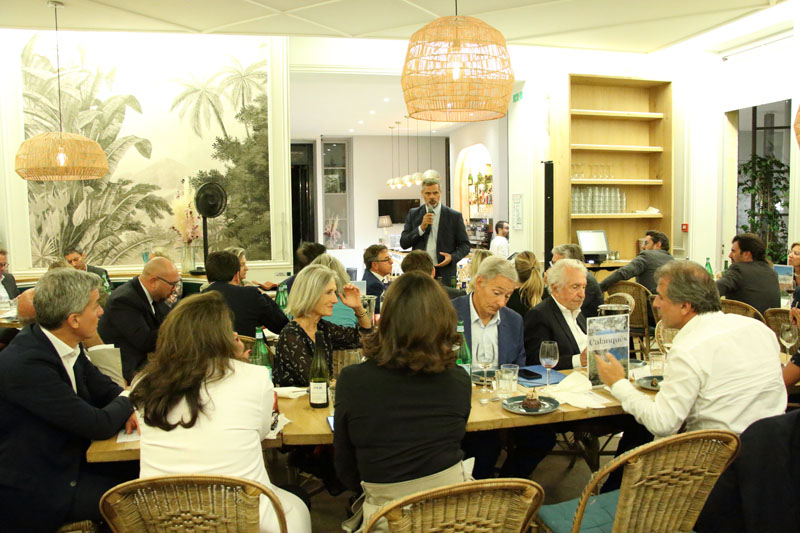
Speeches delivered to the Club des Marseillais de Paris
The Club des Marseillais de Paris is a great network of ambassadors. Its members are devoted natives of Marseille working to amplify their hometown's influence at the national and international levels. For more than three years, Provence Promotion has regularly arranged informative and topical meetings for the group. After organizing presentations on the region's hyper-connectivity in 2020 and the future of workplaces in 2021, the agency chose nature as its theme for 2022 with a dinner at the symbolic Jardins des Plantes in Paris.
More than 50 business leaders came to find inspiration in the speeches given by experts such as guest of honor, Bruno David, President of France's National Museum of Natural History, Maud Lelièvre, President of the French Committee of the International Union for Conservation of Nature (IUCN) and Patricia Ricard, President of the Paul Ricard Oceanographic Institute.
The Aix-Marseille-Provence Metropolis is exceptional for its irreplaceable natural resources. An impressive 50% of its surface area is made up of coastal, mountainous and temperate natural spaces to be protected. Managing this "green capital" is crucial for future generations.
This dinner with the Club des Marseillais de Paris, organized as part of the collective influence program led by Provence Promotion, was an opportunity to reiterate the colossal stakes of preserving biodiversity and discuss avenues of action for all stakeholders, including business leaders, major institutions and local authorities.
 Bruno David, President of the French National Museum of Natural History, eminent researcher, biologist and paleontologist, reviewed the specific characteristics of the current multi-factor crisis that we are experiencing, which involves pollution, global warming and the accelerated extinction of species. He noted that the cost of inaction is estimated at 7% of GDP. He described the singularity of the Mediterranean region and praised all the initiatives that are encouraging changes in behavior vis-à-vis nature.
Bruno David, President of the French National Museum of Natural History, eminent researcher, biologist and paleontologist, reviewed the specific characteristics of the current multi-factor crisis that we are experiencing, which involves pollution, global warming and the accelerated extinction of species. He noted that the cost of inaction is estimated at 7% of GDP. He described the singularity of the Mediterranean region and praised all the initiatives that are encouraging changes in behavior vis-à-vis nature.
"I support Marseille for its robust slate of local initiatives. These can quickly bear fruit, as demonstrated by the creation of the Calanques National Park and actions to preserve the park. The specific oceanographic challenge around the Mediterranean is finding a way to preserve the thermal inversion of shallow and deep waters and the annual oxygenation cycle," explained Bruno David, who exhorted the audience to be proactive and take action. Environmental issues must be addressed in the earliest stages of your business strategies, just like HR, facilities or a car fleet. Your companies have real leverage. They know how to be effective and the sum of these changes will have an overall impact on biodiversity," he asserted, firm in the belief that thinking locally contributes to the national effort in a global context.
Taking into account the industrial context of Aix-Marseille
The Aix-Marseille-Provence Metropolis, the Bouches-du-Rhône Department and the Sud Provence-Alpes-Côte d'Azur Region are widely encouraging such an ecological transition, in partnership with manufacturers. Over the past 18 years, 1.2 billion euros have been invested to decarbonize industry in the Etang de Berre area.
Jean-Luc Chauvin, President of the Aix-Marseille-Provence Chamber of Commerce and Industry and Vice-President of Provence Promotion, also pointed out in his speech that spending on the environmental transformation of production units is accelerating. "2.3 billion euros have been pledged over 8 years to fight pollution and we need to get the word out. As the leading maritime center in terms of the number of port facilities, the region is also very active in protecting marine biodiversity and decarbonizing maritime transport," he added that the work being done at the Marseille Provence Airport goes beyond the building itself. The project also aims to be carbon neutral by 2030 and is investigating sustainability, clean energy and green passenger transport solutions.
"Provence Promotion seeks to assist new industries and nature innovators. We have adapted our road map to focus more on companies engaged in low-carbon operations and green innovations," said Bernard Deflesselles, the agency's president. To help these emerging businesses establish operations in Provence, the team works closely with the region's economic actors and major developers. The development strategy at the Port of Marseille Fos is also contingent on significant innovation projects with sizable investments in green hydrogen and steel production. Lionel Rivière, Director of Resource Optimization and Innovation at the Grand Port Maritime de Marseille, emphasized the Port's desire to reconcile regional and environmental interests, while pointing out that the Port manages 25,000 acres of natural space, 25% of which is protected.
The importance of thinking and working together
 At the dinner, Maud Lelièvre, President of the French Committee of the International Union for Conservation of Nature (IUCN), spoke about her experience and Marseille's success in hosting the World Conservation Congress in September 2021.
At the dinner, Maud Lelièvre, President of the French Committee of the International Union for Conservation of Nature (IUCN), spoke about her experience and Marseille's success in hosting the World Conservation Congress in September 2021.
"The competition was difficult and it took five years of preparation to pull off the event. Marseille won the bid because of its unique landscapes, the internationally recognized diversity of its ecosystems, the quality of its application, and also because of very serious concerns about the Mediterranean," Maud Lelièvre said.
"France is the second-most involved country in the IUCN in terms of member numbers, 200 global experts, 42 associations, 70 organizations (foundations, universities, conservatories, etc.)," she continued. She went on to note that the region is an IUCN reference in the biodiversity atlas with 6,000 species identified and on the green list of protected areas with the exceptional concentration of three sites: the Sainte Victoire nature reserve, the Domaine de la Tour du Valat in Camargue and the Natura 2000 site, Blue Coast Marine. Speaking of the latter, Maud Lelièvre underscored the successful alliance between local governments, fishers and associations who are acting together to implement the marine park's preservation action program, which includes scientific monitoring, regulatory measures, activities and more.
This commitment is also influencing the region's younger generations, Maud Lelièvre enthused, citing the accomplishments of the Department's youth COP initiative, which has convened 200 young people between the ages of 10 and 25 on several occasions to draw up a biodiversity preservation charter. It is an inspiring initiative that has become a model for the IUCN.
Sharing expertise and training elites
 "Today, protecting the last members of a species is equivalent to protecting fire in prehistoric times. It amounts to building a bulwark against even greater chaos. To understand today's issues we must seek the knowledge of others," said Patricia Ricard, President of the Paul Ricard Foundation.
"Today, protecting the last members of a species is equivalent to protecting fire in prehistoric times. It amounts to building a bulwark against even greater chaos. To understand today's issues we must seek the knowledge of others," said Patricia Ricard, President of the Paul Ricard Foundation.
Given that countless solutions are found in nature, Patricia Ricard insisted on the need to break down silos and train elites in the fundamental life sciences to understand an organism's interactions in its environment. "If our elite universities just covered the basics of biology, chemistry and physics, concerns for the living world would be better integrated," explained the biomimicry specialist who has amassed scientific and technical expertise on issues linking economics and ecology.
Pooling skills and knowledge is also a prerequisite for the Sustainable Mediterranean City Laboratory experiments overseen by the Euroméditerranée public planning body. "We are taking a systemic approach to cities and, with an ecosystem of partners (local authorities, government agencies, research centers, universities, manufacturers, etc.) we are developing solutions to strengthen biodiversity and deploy sustainable solutions around mobility, energy and production methods (bio and geosourced)," said Stéphane Ghio, Director of Economic Development and Innovative Partnerships at Euroméditerranée. "As an example, the marine geothermal loop to heat and cool buildings in a neighborhood (housing, shops, offices, etc.) reduces greenhouse gases by 70%. We will also re-create biodiversity and manage heat islands by transforming the Canet train station into a green lung. Working with Météo France, we have seen that there is a potential to reduce the temperature by 4° to 5 °C on the immediate perimeter of this future park. However, the effects on the heat island evaporate rapidly as distance increases, which means that the renaturing effort must be massive and replicated in many places to have significant urban effects."
A project to fight plastic pollution
 Simon Bernard, a graduate of the Ecole Nationale Supérieure Maritime de Marseille, was already well acquainted with the importance of the living world. The president and co-founder of the Plastic Odyssey expedition has been passionate about nature since he was a child. When he was while sailing between Morocco and Senegal as part of the "Nomade des Mers" low-tech innovation world tour, he became aware of the extent of the plastic problem.
Simon Bernard, a graduate of the Ecole Nationale Supérieure Maritime de Marseille, was already well acquainted with the importance of the living world. The president and co-founder of the Plastic Odyssey expedition has been passionate about nature since he was a child. When he was while sailing between Morocco and Senegal as part of the "Nomade des Mers" low-tech innovation world tour, he became aware of the extent of the plastic problem.
"Fortunately, the countries in the Global South have a lot of ingenuity when it comes to recycling. The objective of the Plastic Odyssey expedition is to make plastic transformation economically viable and available to all without technical knowledge and to train 200 to 300 entrepreneurs that we will also help to form a network," said Simon Bernard.
The catamaran, which will make calls in 30 of the countries most affected by pollution over three years, is equipped with a shredder, an extruder and various tools to make new objects: sewer pipes, self-locking sidewalk pavers, roof tiles to replace corrugated sheet metal and more.
The expedition will depart from Marseille on October 1 so that it can quickly access African countries. Marseille is also a symbolic choice because of the city's history as the cradle of many great expeditions and oceanographic advances, such as Jacques Cousteau's ship, the Calypso, and Comex, the Marseille-based company specializing in engineering and underwater work. The Plastic Odyssey vessel will be docked and open to visitors from September 23 to 25 at the Mucem museum.



 +33 4 96 11 60 00
+33 4 96 11 60 00





